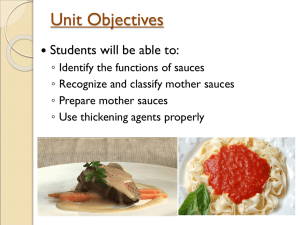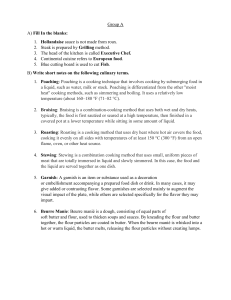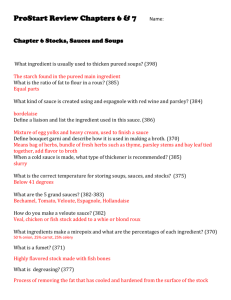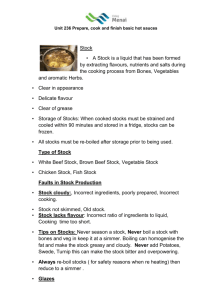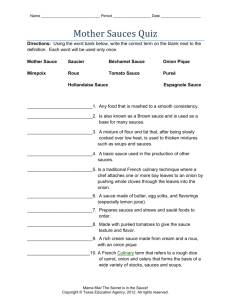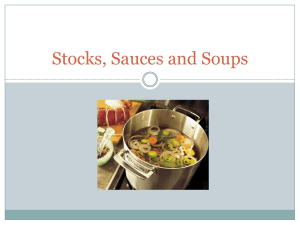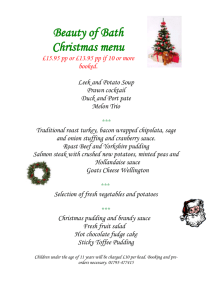File
advertisement
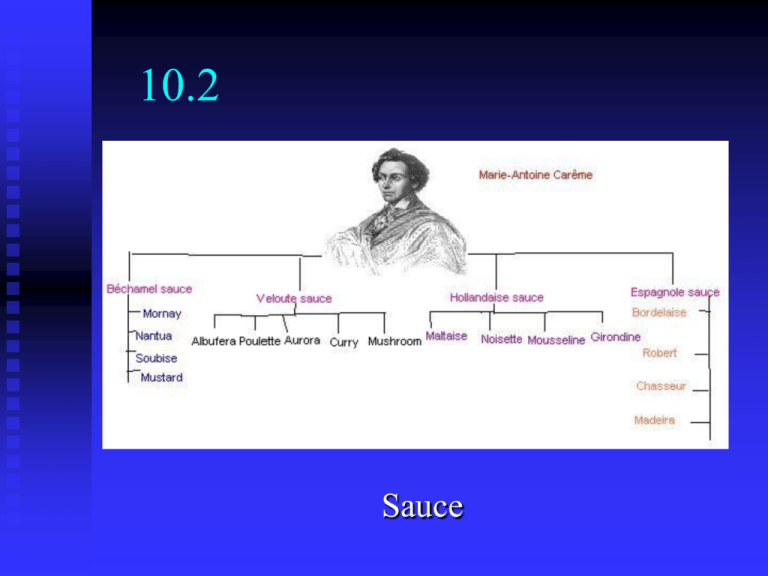
10.2 Sauce Objectives Identify 5 mother sauces and various smaller sauces Discuss various thickening and finishing techniques Describe essential parts of sauce Prepare various sauces Key Terms Mother/Leading sauce Small/Compound sauce Roux Slurry Beurre Manié Liaison Temper Jus Lié Reduction Monter Au Buerre Béchamel Velouté Espagnole (brown) Tomato Hollandaise Demi-Glace Definition A sauce is a liquid + a thickening agent + seasonings Start with good stock Properly use thickening agents for desired texture, flavor and appearance Use seasonings to achieve desired flavor Thickening Agents Most methods of thickening sauces employ gelatinization. Gelatinization: starch granules absorb moisture when placed in a liquid and heated The starch granules swell and liquid becomes thicker Thickening Agents Typical starches for thickening include Flour Cornstarch Arrowroot Potato starch, rice flour, tapioca, gums and colloids. Starch Thickening Starch Thickening Power Roux 1 part flour 1 part fat Coating starch granules with fat prevents lumps and lumping when adding liquid Cold stock to hot roux Hot stock to cold roux Roux Roux Stages White Cooked briefly, removed as soon as a frothy, bubbly appearance develops Used in white sauces; béchamel Roux Stages Blond Cooked slightly longer until a little color develops from caramelization of flour Ivory to yellow color Richer flavor velouté Roux Stages Brown Cooked to a dark color with a nutty aroma and flavor Less thickening power Espagnole Roux Stages Preparing Roux Melt clarified butter or other fat Add flour to form a paste Bread and high gluten have less starch compared to AP, pastry or cake Cook over medium heat to desired color The thickening power of flour begins near boiling Incorporating Roux Cold stock, hot roux; hot stock, cold roux Room temperature Whisk Cook about 20 minutes to remove flour taste Roux Guidelines Avoid aluminum pots Heavy bottom pot Avoid extreme temperatures Avoid over thickening Beurre Manié Equal weight butter/flour kneaded into a paste and formed into small balls. Quick thicken at finish Cornstarch Fine white powder of pure starch derived from corn Twice the thickening power of flour Two types of starch molecules Amylose (long) [gelling] Amylopectin (short, branched) [thickening] Amylose Amylopectin Cloudy when Cool Relatively high clarity Forms firm heavy-bodied gel Thickens, does not gel when cooled Tightens and weeps over time Does not weep over time Not freezer stable Does not weep when thawed Much thicker cold than hot Same thickness Tends to mask flavors Less likely to mask flavors Slurry Cornstarch mixed with a cool liquid Reacts instantly with heat Slurry can be added to cold or hot liquid If hot whisk constantly Moderately cook 5 minutes to clear taste Liaison Mixture of egg yolks and heavy cream Whisk together 1 part yolk : 3 parts cream TEMPER yolk/cream mixture by whisking in a small amount of hot liquid Whisk warmed liaison into hot liquid Liaison Remember Plain egg yolks coagulate between 149°F. and 158°F. Yolk/cream mixture coagulates between 180°F. and 185°F. Finishing Techniques Reduction As sauce cooks, moisture is released and sauce concentrates (thickens) Straining China cap and cheese cloth or Chinois Wringing Method: Pour sauce through cheesecloth into bowl. Twist both ends of cheesecloth to strain liquid from solids Monter au Beurre Whisking in butter at end to enrich Sauce Families LEADING or MOTHER or GRAND Béchamel Velouté Espagnole (brown sauce) Tomato Hollandaise Béchamel Thickening scalded milk with white roux, flavored with onion and clove Rich, creamy, smooth Onion and clove apparent, not overwhelming Color of cream Coat foods lightly Small Béchamel Sauces Velouté White or fish stock and blond roux Made from veal or chicken, base for 2 intermediary sauces; Allemande and Suprême Rich, smooth Should taste liquid (chicken/fish) Ivory-yellowish color Thick enough to cling Velouté Fish Stock + Blond Roux = Veloute Blond Chicken Veloute + Roux = Stock Blond Chicken Veloute Stock + Roux = Veal Stock + Blond Roux = Veloute Suprême Cream + Liaison + & Lemon Liaison + & Lemon = Allemande = Allemande = Espagnole Brown stock, brown roux, mirepoix, tomato, sachet Full bodied and rich Generally used to make demi-glace (intermediary) Demi-glace Equal amounts, by weight, of brown sauce and brown stock, reduced by half Jus Lié Used like demi-glace Brown stock thickened with cornstarch or arrowroot or thickened by reduction Tomato Basic tomato sauce contains tomatoes, vegetables (mirepoix), herbs, spices cooked and pureed Often meat and/or bones are added Derivatives: Creole, Portuguese Gastrique Caramelized sugar deglazed with vinegar used to flavor tomato or savory fruit sauces Hollandaise Egg yolks, water/lemon/vinegar, butter Emulsified Unmixable liquids, such as oil and water are forced (connected) into a uniform distribution, in this case with lecithin from egg yolk Smooth, buttery with vinegar and lemon taste, no signs of separation, nappe nicely covers, not heavy like mayonnaise Hollandaise Carême method Cook egg and water based ingredients (or reduction) first to a thick consistency Whisk in pats of whole butter, or warmed clarified butter to emulsify the butterfat and thin the continuous phase Hollandaise Escoffier method Warm egg and water based ingredients Whisk in whole or clarified butter Cook to desired consistency Hollandaise Blender method Yolks, water lemon juice and seasonings in blender and blend 5 seconds Add 175°F. butter in a steady stream Strain, adjust seasonings Hollandaise Temperature 140°F. - 150°F. Broken For 1 qt., 1 Tbsp. water in clean bowl, whisk in sauce If overcooked or too much butter add 1 yolk to water Buerre Blanc Emulsified butter sauce without egg Shallots, wine, wine vinegar, butter Thinner than hollandaise Temperature 110°F. - 120°F. For Rouge: substitute red wine and red wine vinegar for white Buerre Blanc Method 6.25% (bw) shallots, minced 25% (bw) dry white wine 25% (bw) white wine vinegar Reduce by 90% (a sec) 12.5 % (bw) heavy cream, optional Whisk in butter, strain Compound butters Made by incorporating various seasonings into softened butter Pan Gravy Coulis Sauce made of pureé of vegetables and/or fruit
